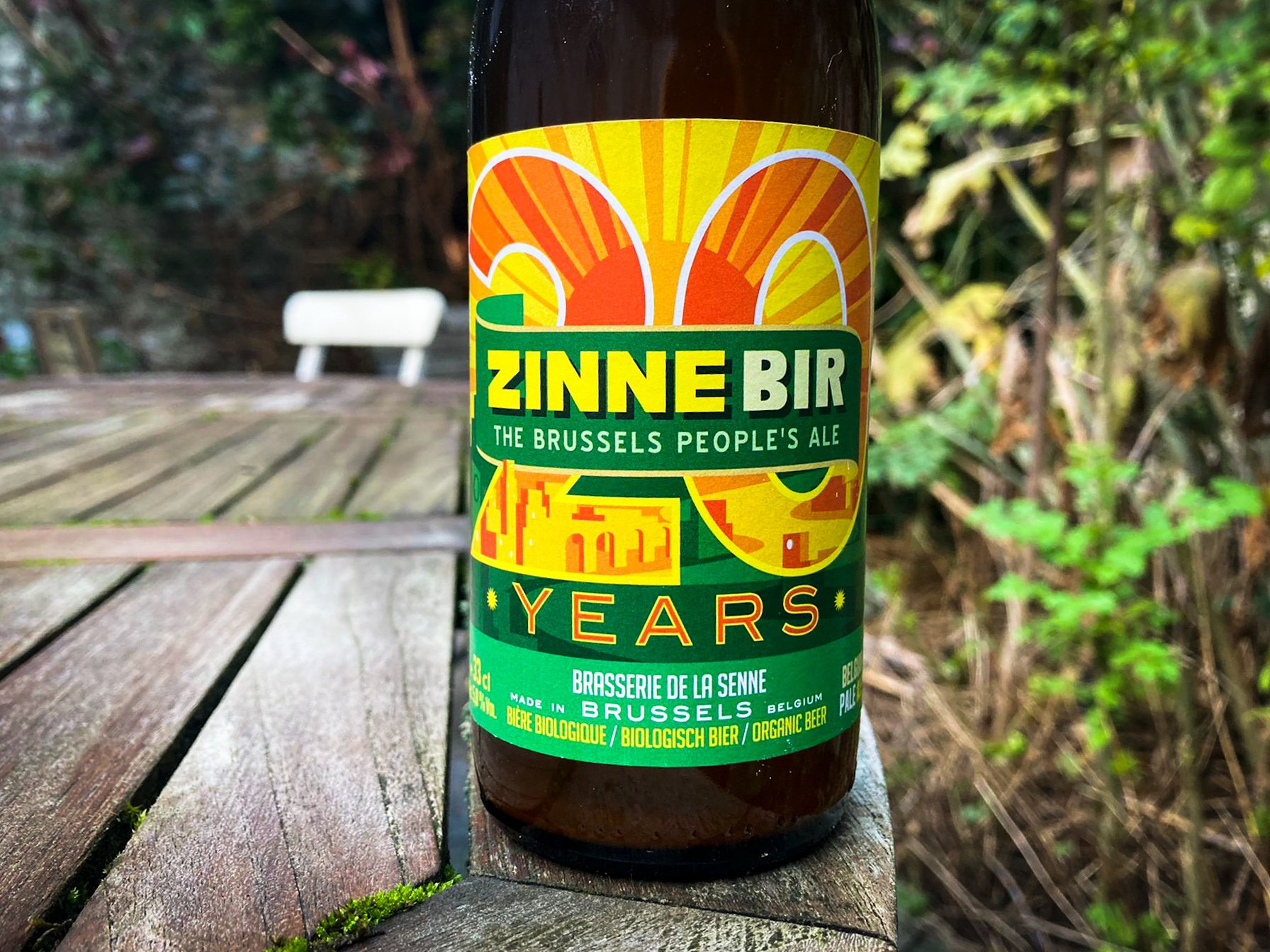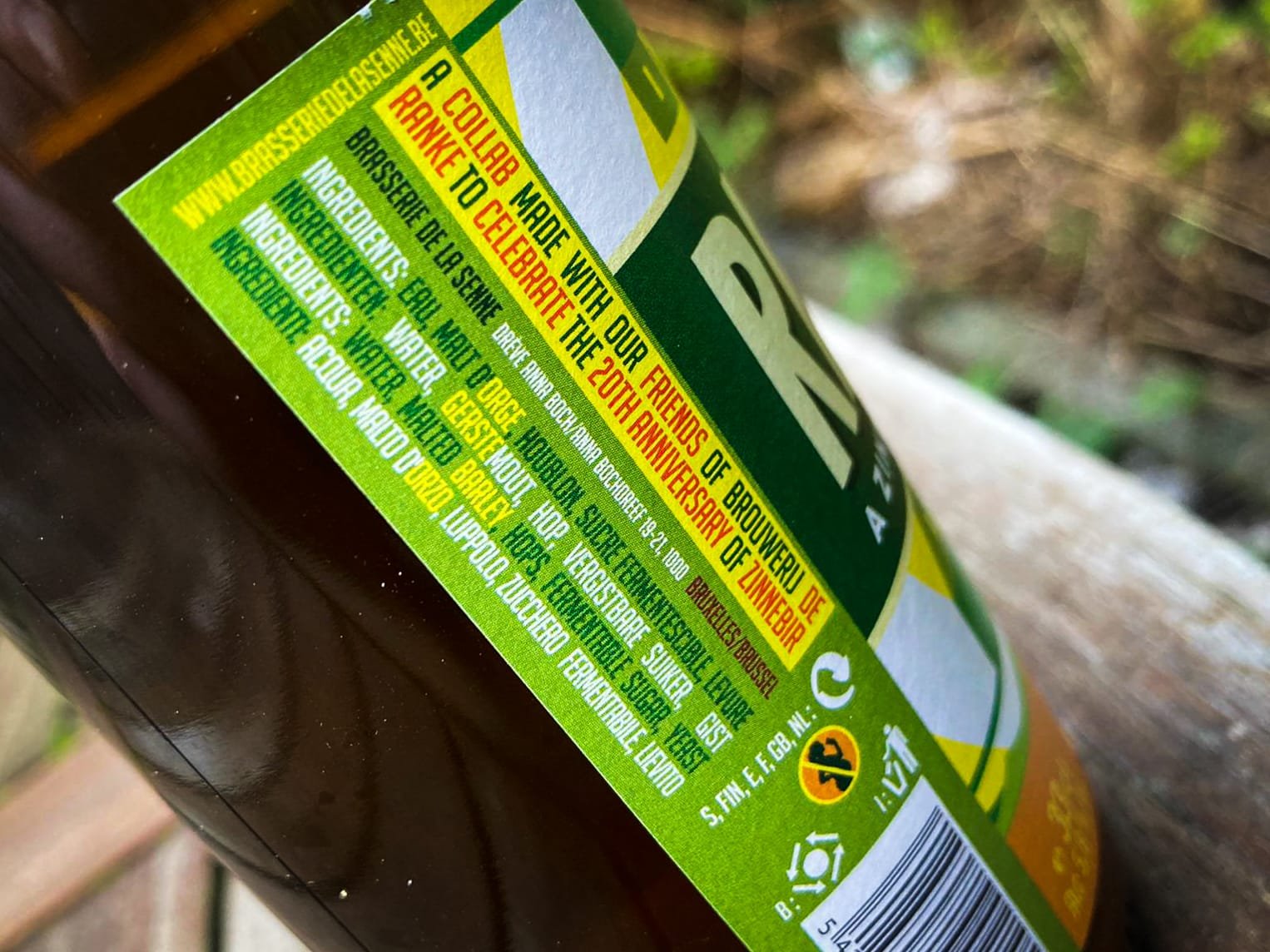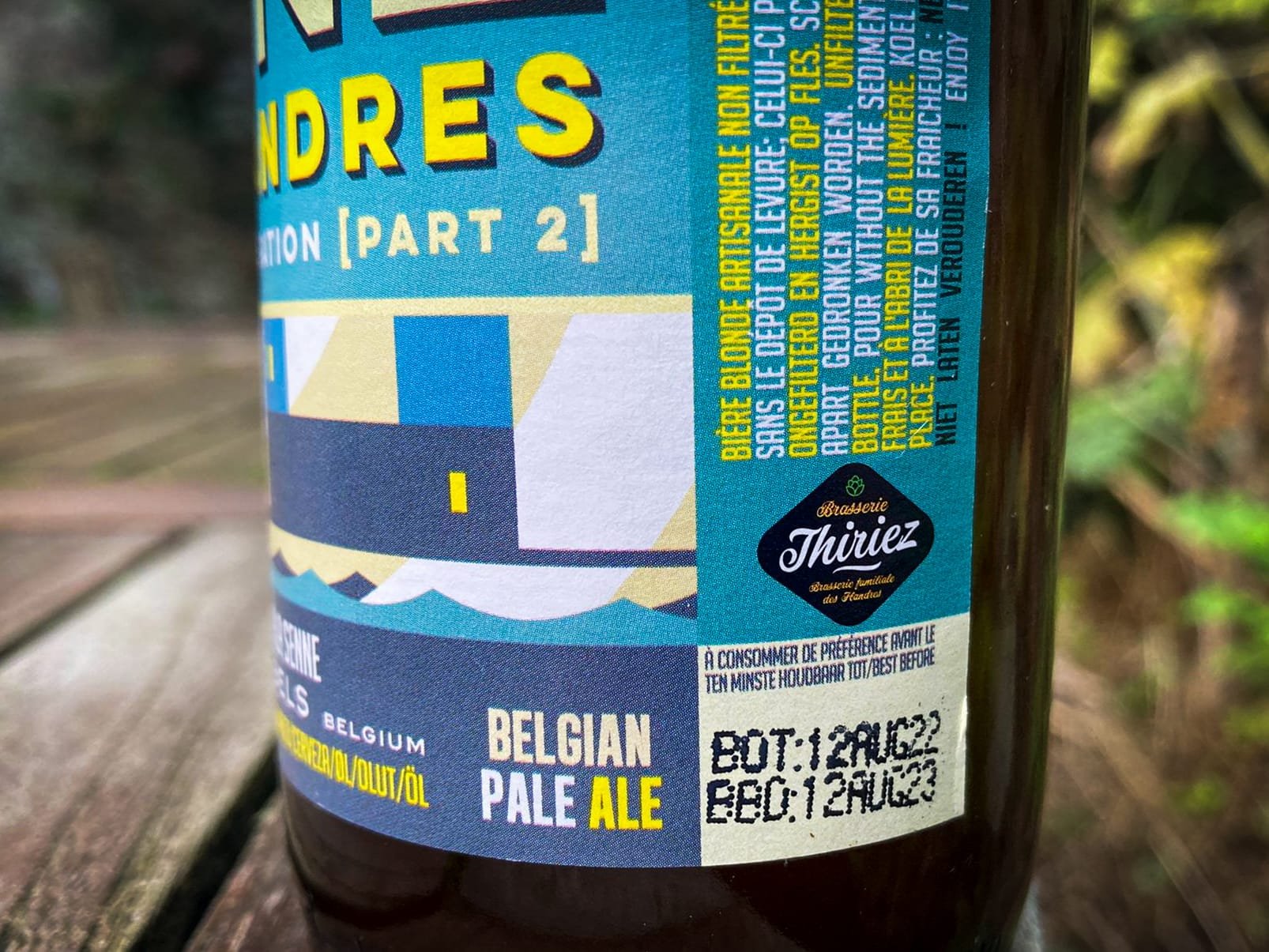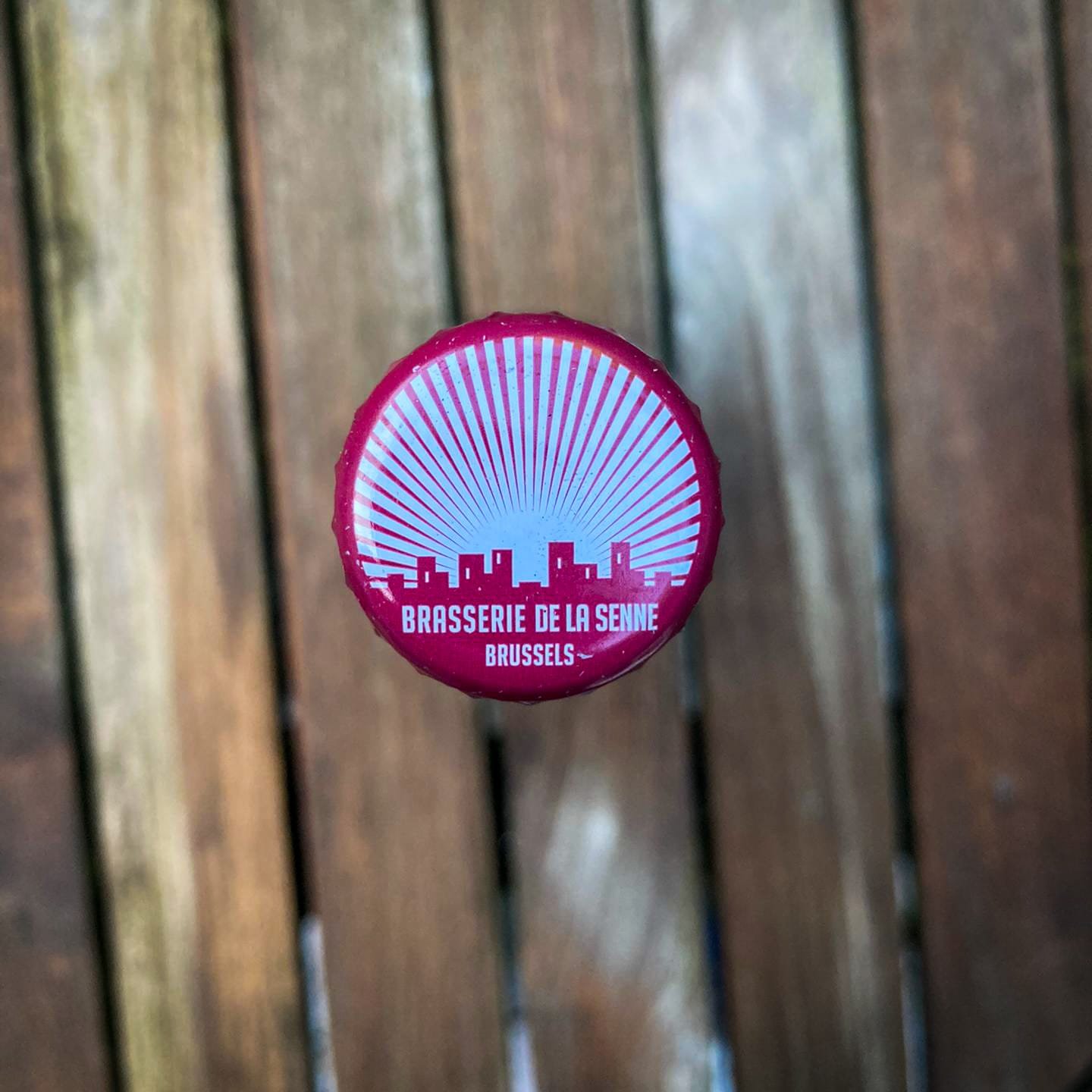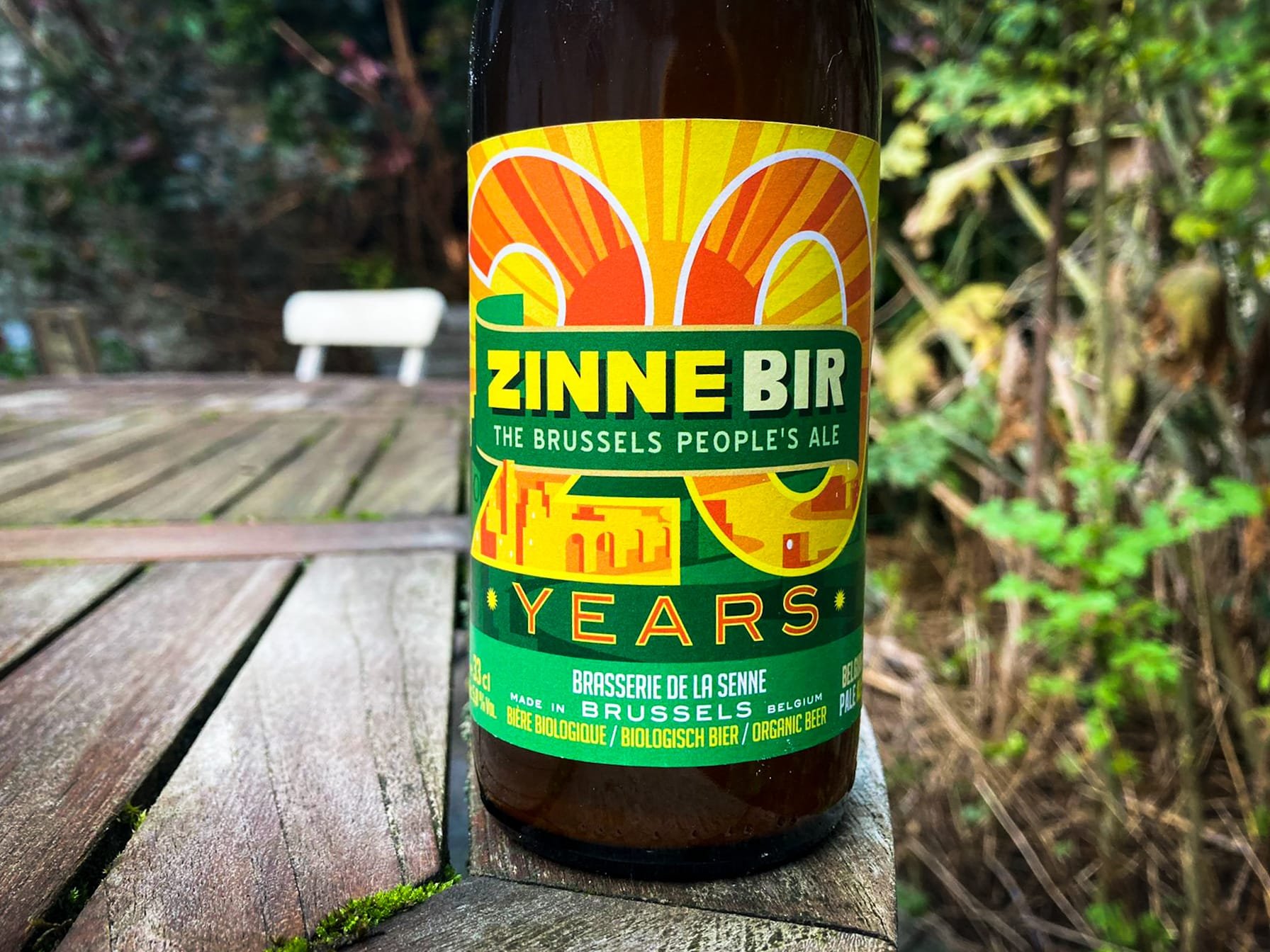Zinnebir @ 20 // 20 views on 20 years of Brasserie de la Senne's era defining beer
In case you may not have heard - and, if you live in Brussels, you’d have to been living under a rock not to notice - on 1 October 2022 Brasserie de la Senne celebrates the 20th anniversary of the first ever brew of their flagship Zinnebir, which is also recognised as the official birth of the brewery.
Now, I’ve written at length about the importance of Zinnebir both to me and to the origins of this very website. I would urge you to read my article about it here, at Pellicle. I’ve also written several times about Zinnebir’s - and Brasserie de la Senne’s - backstory, which you can read here, and here. You might even call me a Zinnebore.
So, instead of me rattling on about my love for this epochal beer, I thought I would ask some of the beer’s (and Brasserie de la Senne’s) ardent fans - brewers, writers, drinkers - for their favourite memories, their Zinnebir light bulb moments, and what inspiration the beer has played in the lives, personal and professional. And from Brussels, Prague, Toronto, Bangkok, Santa Rosa, and elsewhere - here’s what they had to say.
Santeï!
In The Beginning
Raida Axel, former resident of squat where Zinnebir was born:
"I tasted the very first batches of Zinnebir, because I used to live in a squat along with its creator Bernard Leboucq. Basically it was just a small hobby for him and he would brew in the basement. The very first clients were us, the squatters themselves. Then the clients of the "table d'hôtes" that we would organise. I remember when we served it out of stolen supermarket trollies during the "famous" Zinneke Parade in Brussels. Of course the trollies were given back to Colruyt when the hangover was over..."
Tim Webb, Beer Writer:
"I have known Bernard for nearly 20 years, Yvan for longer. I have watched each of them develop from enthusiast to obsessive to entrepreneur and on to becoming masters of their craft. After 30 years of compiling Good Beer Guide Belgium and a decade of co-writing The World Atlas of Beer I have seen many enthusiasts, obsessives and entrepreneurs, in Belgium, the UK and all around the world, enter the complex world of brewing, and watched so many lose their way, or their livelihoods.
“Never once have I seen Brasserie de la Senne's vision fail, or been concerned that the vision and the reality were drifting apart. This brewery is a brilliant role model for anyone wishing to make a career out of changing the beer world for the better, one glass at a time. I have been honoured to support them in everything they have done and look forward to doing it for another 20 years.”
Discoveries
Jordan St. John, Canadian beer man:
"If you go to Brussels, the beer nerds will tell you that you must try Lambic and Gueuze.
“I was walking down Stalingrad to Cantillon and saw Cafe Bebo, which appealed to me in the moment more than either of those beer styles. On a hot August day, the lightly fruity, slightly dry, but eminently refreshing Zinnebir seemed the perfect thing after the walk from Sint Joost. The second one was also delicious, but on its own merit.
“Of course, no one had recommended Zinnebir, but there's something to be said for discovering things yourself. It lets you know what people take for granted."
Jeremy Kuprowski, journalism student by day, craft beer bartender by night, and mastermind behind the "Pas la Jup de ton Père" podcast:
“While I can't remember my first Zinnebir, I distinctly remember meeting with friends every day at lunchtime to try a new beer. Afterwards, we would write all our feelings about the beers we’d tried in a small book (kind of like a physical Untappd!) It was mostly industrial crap, to be fair, but then we were all teenagers. One day, we stumbled across a Jambe-De-Bois. Honestly, we chose it merely for the name alone.
“But what a wake-up call it was. It was the first time I had a Tripel that was so damn bitter! It became clear to us afterwards that stepping out of our industrially-brewed comfort zone was now, definitely, the way to go. Soon enough, Grosse Bertha followed. Then XX Bitter... And Zinnebir probably quickly joined those trophies too. If it wasn't for that fateful day, I guess I would still be drinking something like Barbar. But Brasserie De La Senne opened the gateway to heaven.”
Cedric Dautinger. Beer.be head writer and journalist:
“My first beer interview was with Jean Goovaerts when I was still studying journalism at ULB. We met at Pin Pon, now gone; Jean had made the designs for the bar, as well as being responsible for the Zinnebir label. We had Zinnebir on tap, which was not common back in those days. Now, I'm really happy to see that beer on tap in various cafes in Brussels.”
Fergal Driver, beer lover:
“Having moved here to Brussels nine years ago, I had drunk quite a few styles/strengths of beer until I came across the wondrous Zinnebir. It was nowhere near as ubiquitous as it is now, but I tasted in it right away the perfect balance of hops and bitterness, with a delightfully reasonable strength of 5.8%. Not at all like the dangerous, if amazing Trappists. I remember being impressed by how it managed to retain a low ABV, while having a cracking flavour and body. Since then, it's become far more widely available - a great addition to any cafe menu or festival - and a regular choice for me. Keep 'em coming lads.”
Filip Nerad, head of the foreign news desk for Czech Radio in Prague, and author of The Beer Kingdom of Belgium:
“Brasserie de la Senne and Zinnebir are the best tools to fight certain preconceived views people have about parts of Brussels. Molenbeek, where Brasserie de la Senne’s brewery was originaly located, has been stigmatized as a no-go zone full of terrorists. But I have always explained to people who say this that Molenbeek isn't any kind of no-go zone, for many reasons - and I have alway given this brewery and this beer, the best of their kind in Brussels, as one of those. Because, to my mind at least, there couldn't be a no-go zone where such a good brewery was run and such a good beer was made. And at least for some people, it’s been a convincing argument.”
Lana Svitankova, Ukrainian author, translator, beer judge:
I enjoyed my most recent glass of Zinnebier at the Brasserie de la Senne newly opened taproom, and as I was nursing my beer, I came to a long-due realisation, that it is all about resilience to me. Attitude. Trailblazing. A perpetual movement to perfection. When I discovered Brasserie de la Senne in 2010, choosing Taras Boulba among a 400+ bottles menu at the “Cambrinus” café in Bruges, I wasn’t really thinking about the beer itself. The name beckoned to me because I am Ukrainian.
“Zinnebir made its appearance a bit later, when I was still just a hatchling of beer-lover. At that time there were only two breweries in Brussels. Now it’s 13 and the number continues to swell. Even in a less competitive market getting through a decade is a tangible accomplishment, and a core-range beer surviving the ebb and flow of novelty, fashion, and fads is impressive. So upon finishing the glass I think that in the end probably, secretly, in the very deep corners of their malty, hoppy, yeast-driven, fruit-swarming, or pastry-oozing soul every beer dreams of becoming a Zinnebir.”
Vinnie Cilurzo, Co-Owner of Russian River Brewing Company:
“I first had Zinnebir at the Zythos Festival, probably 14 years ago? I honestly can’t remember what year it was. But I certainly remember the beer for its focus on hops, while still having a nice malt contribution all the while it being dry. Over the years it has become more refined and more lovely. I always look forward to drinking it on trips to Brussels.”
Adrian Tierney-Jones, author of United Kingdom of Beer: 250 top beers in bottle and can:
“I first encountered Brasserie de la Senne’s beers on a visit to the brewery in Molenbeek in 2011, and the first one I tried was Zinnebir: this darkish blonde beer stood out like a great tranquil giant with its lively bitterness, machine-gun bursts of grapefruit and quenching sand dune-like dryness. This was not a beer that was drowning in a sweetness that seems to categorise mass-produced Belgian beers; this was not the kind of beer that tourists were downing in the centre of Brussels.
“This was a grown up beer whose barging into bitterness was no accident. ‘We like bitterness,’ Yvan said to me then. ‘I have always tried to understand the enjoyment of bitterness. Bitterness differs between humans and animals.’ I was fascinated, and since then my appreciation for Zinnebir has grown and it’s a beer that I have since been endlessly entranced by. During dark winter days it’s an ideal beer for reminding you of the zest and zing of spring days to come.”
Inspiration
Roman Hochuli, founder of Solvay Society Brewing:
“Having grown up in Belgium, I'm a huge Belgian beer fan and this has become the focus (obsession) of my own brewery. As a teen growing up in Brussels I certainly tried a lot of classic Belgian beers but struggled with most of them: I remember hating Chimay Bleue for how sweet, rich and boozy it was (I love it now!). After my first year of university, in 2008, I went back to Brussels and my mum had picked up a selection of Belgian beers as a welcome home treat (as if I needed more beer after a year at uni in London). One of the bottles had a label with a futuristic design and was dubbed 'Brussels People Ale'.
“It looked cool, it tasted cooler: it was the first time I'd found a beer that was a bit of me. It tasted modern, in its hoppy aroma and bracing bitterness, while having a distinctly 'Belgian' edge in its spiciness. I fell in love, so much so that what Zinne did for me is something that I hope to do for everyone who drinks my brewery, Solvay Society, beers now - to change their perception of "Belgian beer".
Xavier Ethuin, organiser of Wallonhill longboard festival:
"A long time ago, I was walking with friends in Brussels. The sun was beating down, and we had only one word in our mouths: ‘Beer’. And I chose a fabulously-labelled beer! I fell in love with it so much that I immediately did some research and came across Jean Goovaerts. I contacted him straight away, asking him to design the poster for the WALLONHILL longboard event that I organise in my village every year. Jean did us the honour of making the poster, and the Brasserie de la Senne even put together a series of beer labels bearing the image of the event (ultimate goal unlocked!). I still have the relics of this blessed time as well as an unforgettable memory of this magnificent adventure! Thank you Jean, thank you Brasserie de la Senne.”
Luc De Raedemaeker, Chief Editor Bier Grand Cru:
“Brussels is known for many things. As a nice place to stop and buy a waffle on the way to France. As a city of 1.2 million, the HQ for the EU and Nato. For Manneken-Pis and its bawdy humour. For its Grand-Place, and the Atomium, the waffles and the chocolates. But above all it is the world’s beer capital. And in Brussels, there is Brasserie de la Senne and a real Brussels icon - Zinnebir, the beer of the Senne, the river of Brussels. This river dribbles its way through the Pajottenland before flowing through Brussels.The name also refers to the Brussels word 'zinneke' which is slang for the mongrel dogs that used to live in the poor areas of the city along the Senne.
“The beer is also known as the ‘Brussels' people ale'. We are spoiled indeed. It is, to me, a beer that illustrates Yvan De Baets’ philosophy nicely: as few ingredients as possible to create as much flavour as possible, while keeping the beer at a low alcohol level. Or as the man himself says: ‘The lighter the beer, the longer the fun!’
“For me, the best place to enjoy a Zinnebir is the ‘Monk, in Brussels’ Vismarkt neighbourhood. It’s a must-visit, cosmopolitan place where tradition and new trends go hand in hand - not unlike Zinnebir itself.”
Jean-Yves "Jyve" Horn, Brasserie de la Mule:
“For me the first time I discovered Zinnebir was at the Bruxelles Champêtre festival in 2008, with some friends. Yvan and Bernard were there to promote their beers. It was really complicated for me to discover the kind of bitterness that Zinnebir had. But after the second glass, and two Jambe de Bois later, my conversion was done. Never again a Jupiler! Later, I got my first bar in Jette, "De Gele Poraa", and I wanted to use it to share my love for De La Senne, and everywhere I have worked since, I have tried to share and promote the brewery. Two years ago, I was working in the Zebrano restaurant in Molenbeek, where they always serve Zinnepils on tap and Jambe de Bois as their triple the whole year round; and it was Molenbeek where I met a man called Joel Galy, who was working at De La Senne, the man with the mulet who I’m now working with in our own brewery!”
Sam Fleet, Production Manager at Brussels Beer Project:
“I can pinpoint the moment the world shifted on its axis. I was sitting on the terrace of Verschueren, where for years a Zorro-like flick of the finger ordered a new round of Zinnebir for our table. There was none, and it wouldn't be back. Brexit; Trump; Covid; the world spiralled. Even the letter Z became toxic. We searched for an alternate drinking hole that would satisfy our thirst; it felt like it would never be the same again. It still doesn't.
“Zinnebir has been part of the social fabric of my life here in Brussels ever since I arrived in 2009. From the early days when it was the only choice on vast beer lists with any drinkability – to today, remaining an avid Zinnebir fan, but also proud brewer of another well-known Brussels beer, playing my part in dragging Belgian beer into the 21st Century. The next decade looks to be as challenging as ever within the brewing scene, and beyond. Let’s hope a little solidarity, and social glue, can restore some balance.”
Hélène Spitaels, Once in Brussels guide, beer sommelier, writer, board member of Pink Boots Society – French Chapter:
"Somewhere in 2014, I'm drinking Zinnebirs at the inauguration of the then-new park at Tour & Taxis. Then Bernard - whom I knew from too-regular nights out with friends to bars in Schaerbeek - asked me whether I would be okay taking over the pouring of beers for customers. The kegs were nearly empty and he needed to go back to the brewery (still in Molenbeek then) to bring more beers. What could I say? Of course, I agreed and had a FUN night, under a bridge, in a park, serving Zinnebirs. I am sure that that moment was a cornerstone in my decision to change jobs and start as a beer sommelier. And today, I am working alongside with the De La Senne team to help them organise the event of the year: the 20th anniversary of our dear Zinnebir. What a journey since 2014."
Missionaries
Dennis Vansant, beer nerd of about fifteen years, former bar manager of 1420 in Copenhagen:
“My friend Eric would always come into my bar in Copenhagen asking for Zinnebir. As it's obscenely cheap by Danish standards and so flavourful, it would fly out the door. Cases would rarely last the weekend and since Eric's a chef, he'd drink on Mondays in the few places that were open. I saved bottles for him, almost expecting it would be like the joke where a bunny walks into a bakery asking for carrot cake and when the baker finally cracks and bakes a carrot cake, he says: "gross, isn't it?" But it was never like that. Eric loved his Zinnebir. It's a fond memory of my time in Denmark, and now that I'm back, I get to relive it even cheaper!”
Joe Stange, managing editor of Craft Beer & Brewing Magazine and the Brewing Industry Guide and co-author of Good Beer Guide Belgium. Joe co-authored the first edition of Around Brussels in 80 Beers with Yvan De Baets—and the presence of Zinnebir often was helpful in finding bars worth knowing:
"In its earliest days, it was hard to find—only in the most serious beer bars plus a few weirdos. By the late ’00s, its presence was how you know a random bar or restaurant in Brussels was worth entering—and that’s still true. (I’ll never forget randomly bumping into Yvan around town in those years, hand-delivering boxes of beer to various better bars out of the trunk of his car. It was a big deal when he and Bernard got a truck.) By gaining a toehold then a whole foot and then hustling its way into the whole hospitality scene, that beer, its makers, and its fans raised the beer quality of a whole city—and eventually helped shift the palates of a whole country. On specialist bottle lists at cafés scattered across Belgium, Zinnebir had to be on that list next to XX Bitter.
“Today—I say this a lot, stop me if you’ve heard it—it’s the Guinness of Brussels. That is, it’s the beer you absolutely must drink on draught when you’re in town, because—while it tastes great everywhere—when it’s fresh in Brussels it’s absolutely sublime. While I greatly miss the days when I lived there and always stocked it in my fridge—and would sometimes pour two bottles together into a large Czech-size mug!—I also cherish more recent memories of sitting and eating and drinking with a friend at a place like Le Dillens, ordering plate after plate of salty smashed roast potatoes and glass after glass of Zinnebir, because we didn’t want to stop or leave. They may have kicked us out eventually."
Melissa Cole, international beer judge and author of The Ultimate Book of Craft Beer:
"I am told as a parent you shouldn't say you have a favourite child and with many brewers it’s the same, they claim to love all their beers equally, but Yvan makes no pretence that Zinnebir is his golden child.
“For those of you who know the quasi-vampiric nature of Mr De Baets, you won’t be surprised I came to this conclusion at 3am in the morning in a smoke-filled bar crammed with off-duty hospitality staff, as we drank glass after glass of Zinnebir, arguing furiously at times about aspects of the beer industry, agreeing vehemently most of the time about things we both hated and loved, and generally setting the world to rights.
“Honestly, if I could remember more of the evening I feel like we came up with a manifesto to fix the brewing world’s ills… I mean, we probably didn’t but that was the buoyancy of the whole experience, especially as all around us much of the bar was doing the same but always with affection and a shout for another Zinnebir afterwards and that, for me, sums up l’enfant préféré of Brasserie de la Senne, because Zinnerbir is a drink for, and of, the people and I don’t think any of us would have it any other way."
Maarten Schmidt, Brussels-based documentary film producer and founder of the Storyhouse production company:
“I once produced a film, together with the director Maria Tarantino, about Brussels called ‘Our City’. For our Brussels premiere, which was sold out five evenings in a row, we wanted to do something special. Maria being Italian and a big (correction, huge, foodie), she knew De La Senne and Yvan since their early days. Offering a Zinnebir to our audience after the screening seemed like a good idea. To turn it into a collector’s item, we printed a limited edition Zinnebir label with ‘Our City’ on it (I have to look for a picture somewhere…). Anyhow, a beer with a tagline like ‘The Brussels’ People Ale’ and it being such a high quality beer, Zinnebir couldn’t be anything else than a true Belgian classic.”

